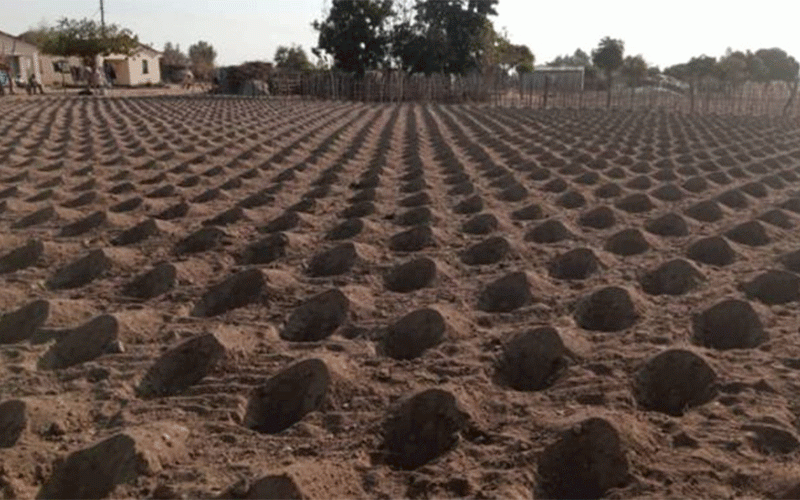
WAR veteran Edward Tongoona began farming in 2008 after receiving land through a controversial programme that redistributed Zimbabwe’s large commercial farms, primarily owned by white farmers, to black farmers. Like many other cultivators, Tongoona doesn’t have a title deed to his land, only an offer letter from the government. This makes it difficult for him to secure a bank loan.
This also limits access to credit especially for the cultivation of maize, a national staple whose production had declined by nearly two-thirds by the time Tongoona took to farming.
It is one reason government in 2015 introduced a contract farming programme, popularly known as Command Agriculture, that is aimed at reducing the country’s increasing reliance on maize imports. Under the programme, by way of a loan, government provides farmers with fertilizer and seed for a season in exchange for five tonnes of maize per hectare, the cost of which is deducted after harvest.
Tongoona began participating in the programme in 2018. “I joined because I didn’t have enough money to buy all that I needed in farming,” he says. “Since then, a lot has changed for me. I was able to buy two tractors and other farm equipment.” Each season, he produces up to 250 tonnes of maize on his 34.8 hectares and sells it to the Grain Marketing Board, a government body that acts as a go-between for farmers and millers. “It’s a good programme. It should continue because it has helped me grow from a small farmer to a more pronounced, commercial one,” Tongoona says.
Not everyone feels this way. Since its inception, the Command Agriculture programme has been marred by criticism, ranging from skepticism over its usefulness in bolstering Zimbabwe’s food security to charges of corruption and cronyism.
According to governance watchdog Veritas, Zimbabwe accumulated a “significant portion” of its sovereign debt which, as of September 2021, stood at $13.7 billion after the programme began. “Financing Command Agriculture has disproportionately bled Zimbabwe’s finances,” a recent Veritas report reads, “with little commensurate benefit to the public.”
In 2017, 54% of farmers enrolled in the programme failed to pay back their loans — in 2018, this number rose to 81%.
Prince Kuipa, operations director at the Zimbabwe Farmers’ Union, which represents over a million small-scale farmers, says this is an unfair burden on Zimbabwean citizens “because most taxpayers do not have farms.”
- Letter from America: The death of the Zimbabwe dollar shows the King has no clothes
- Deputy minister in GMB theft scandal
- ZITF: The hits, misses of 62nd edition
- ZITF: The hits, misses of 62nd edition
Keep Reading
“The best way to finance agriculture is not through government, given its tendency to write off debts,” Kuipa says, adding that the government’s role should be limited to building roads and ensuring adequate storage for harvests. “The private sector is more efficient at administering loans.”
Tawanda Murwira is one of the farmers who defaulted this year. “I only managed to pay back part of the loan this year, even though I intended to pay it all,” he says. “The yields were not good.” This year, Zimbabwe is expected to have a below-average maize harvest, owing in part to delayed rains, but Murwira also points to other delays. “I didn’t get all the inputs I needed, and the few I got I did not get on time,” he says. “We would be sent on a goose chase around the province to get all the inputs. This really affected the timing of our planting and ultimately the output yield was affected.”
The results have been outright contradictory, according to the Zimbabwe Democracy Institute, a local think-tank that evaluated the programme in 2020. On the one hand, maize production and deliveries to the Grain Marketing Board appear to have increased under the programme; on the other, its report notes, food insecurity and maize imports have also increased.
One reason for this apparent contradiction, the report posits, is that the ruling party and “securocrats” a term used in southern Africa for police and military officers who wield political influence — run Command Agriculture as a form of patronage, and its proceeds have been “a very powerful means through which regime loyalists are financed, incentivised and rewarded,” making it “very difficult to translate bumper harvests to food security and maize imports reduction.”
Well-connected farmers tend to receive inputs before others, Murwira says; moreover, he says, inputs designated for the programme are sometimes sold on the black market, on occasion by the very military officers in charge of distributing them.
A 2020 survey of 200 beneficiaries and stakeholders by the Zimbabwe Democracy Institute found that 64% believed that the programme was riddled with corruption. The parliamentary Public Accounts Committee alleges that an estimated $3 billion was misused under the programme.
When asked about these allegations, then Agriculture deputy minster Douglas Karoro indicated he would respond but days later was arrested for allegedly stealing farming inputs from the Presidential Input Scheme, a programme similar to Command Agriculture. He has since been fired; the Ministry of Agriculture did not respond to further requests for comment.
While maize production has increased in recent years, says Andrew Pascoe, president of the Commercial Farmers’ Union, the programme has affected other areas of agriculture, too. “It also tends to wipe away all inputs from the market, leaving those not growing under Command Agriculture in shortage,” he says, adding that delayed payments to input suppliers have a ripple effect on the production of inputs.
“Financing of commercial agriculture should be left to the private sector,” he says, “while the government focuses on creating a conducive policy environment that encourages production.”
Freedom Mazwi, an agrarian researcher based in Harare, disagrees. Agriculture is too important to be left to the private sector, he says, refuting the prevailing notion that Zimbabwe’s reliance on maize imports is linked to the land reforms initiated in the 2000s. “The World Bank and the International Monetary Fund urged Zimbabwe and many African states to withdraw from funding agriculture, and what were the results? Export crops flourished, but the country began to be a net importer of grain,” he says. “There is a lot that can be learned from Command Agriculture by African governments.
Recently, the Rwandese government announced it will adopt a similar approach in the wake of the Russia-Ukraine war, which has made many African countries food-dependent.”
Mazwi also notes that farming inputs are priced in United States dollars while payment of crop output is largely in the local currency, the Zimbabwean dollar, which keeps losing value.
“This has meant that farmers who are paid in the Zimdollar find it extremely difficult to purchase inputs for the next agricultural season, which are pegged in US dollars,” he says.
Mazwi acknowledges that the programme is not without its shortcomings. He and his fellow researchers recommend a more targeted selection of Command Agriculture beneficiaries specifically, larger, mechanized cultivators with a proven history of maize production. Assistance to smaller farmers, he adds, can be channeled through other programmes.
“Very true, there have been maize imports post-2016, when the initiative was first introduced,” he says. “Droughts are the major reason. This is why we suggest that the selection of beneficiaries should target farmers with irrigation facilities and large landholdings to act as a buffer against droughts and other climatic shocks. If this is complemented by a good pricing framework, it can go a long way in boosting national food self-sufficiency.”
Murwira, however, has decided to opt out for now. He is focused on self-financing next season’s crop.
“If well-managed, it is a good programme, but as of now, it is marred with confusion and corruption,” he says. “As it stands, I will no longer apply for funding under Command Agriculture or any government-supported funding. Farming is time sensitive, and time is not of the essence under these programmes.”
— Global Press Journal






